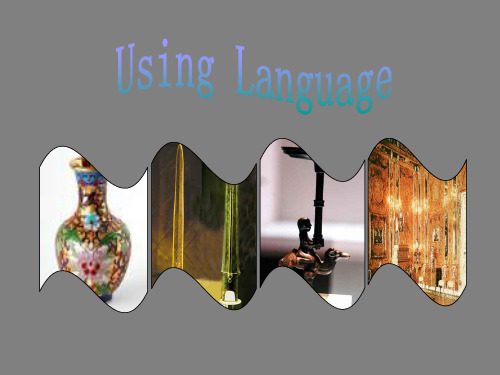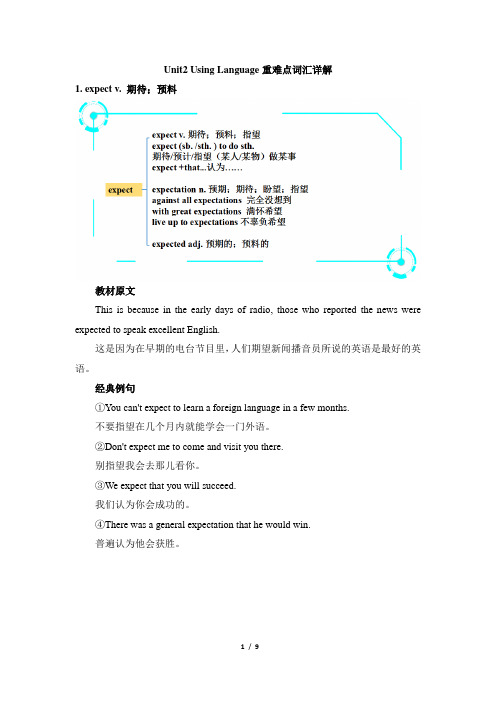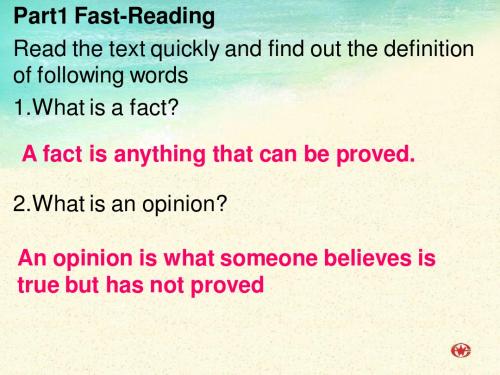人教版高中英语必修二Unit1UsingLanguage
- 格式:pptx
- 大小:4.06 MB
- 文档页数:89


Unit 1 Laugh out loud!Using language教学设计科目:英语课题:Using language 课时:1课时教学目标与核心素养:知识目标:Students can learn some new words and basic sentence structures.能力目标:Students can have a further understanding of the passage.情感目标:Students can think individually and learn cooperatively.教学重难点:教学重点:How to learn the new words and basic sentence structures.教学难点:How to make students have a better understanding of the passage.课前准备:多媒体,黑板,粉笔教学过程:一、Presentation1. Greeting2. Leadingin教师活动:教师提问。
What kind of clauses do you know?二、practiceUsing Language1. 学生活动:plete Activity 1 on Page 6.Look at the sentences from the reading passage and answer the questions:Suggested answers:•In sentence (a) "where" refers to " the waiting area"; in sentence (b) "which" refers to "... laughter produces chemicals to make people feel better"; in sentence (c) "when" refers to "the time".•Sentence ( c) contains a clause with essential information, sentences (a) and (b) contain clauses with extra information, If we take away the clause of sentence(c), the meaning of it is inplete. If we take away the clauses of sentences (a) and (b), the two sentences still make sense.•Sentences (a) and (b) with extra information are separated by mas.2. 学生活动:Look for more sentences with nondefining attributive clauses in the reading passage, and summarize their uses in their own words.3. 教师活动:语法讲解Nondefining attributive clauses——非限制性定语从句根据定语从句与先行词之间关系的密切程度,我们将定语从句分为限制性定语从句和非限制性定语从句两种。



Unit2 Using Language重难点词汇详解1. expect v. 期待;预料教材原文This is because in the early days of radio, those who reported the news were expected to speak excellent English.这是因为在早期的电台节目里,人们期望新闻播音员所说的英语是最好的英语。
经典例句①You can't expect to learn a foreign language in a few months.不要指望在几个月内就能学会一门外语。
②Don't expect me to come and visit you there.别指望我会去那儿看你。
③We expect that you will succeed.我们认为你会成功的。
④There was a general expectation that he would win.普遍认为他会获胜。
2. expression n. 词语;表示;表达教材原文When people us e words and expressions different from the“standard language”, it is called a dialect.当人们用不同于“标准语言”的词语和表达时,那就叫做方言。
经典例句①There was a worried expression on her face.她脸上流露出担心的神色。
②The expression in her eyes told me something was wrong.她的眼神告诉我出事了。
③Laughter is one of the most infectious expressions of emotion.笑是最具感染力的感情表达方式之一。

选择性必修一Unit 1 Using Language 教学设计(一)Lesson content:Explore the meaning of greatnessText analysis:This lesson is a listening and speaking class, and the learning discourse is a dialogue about the tremendous achievements of outstanding figures. The text is set to: first connect the line, then listen to the recording to verify the answer; Listen to the recording for the second time and find out who the interviewer admires the most; Listen to the recording for the third time to obtain detailed information and answer three questions. Next, use group discussions to share the great figures you know and consciously use filler words in the conversation to discuss the reasons why they are 'great'. Finally, based on one's own understanding, summarize the meaning of 'greatness', aiming to cultivate students to be useful to society.Understand the meaning of 'greatness' and be a person who contributes to society.bining English pragmatic goals with the thematic context of this unit, setting up listening and speaking activities to help students improve their English proficiency and deepen their exploration of the theme.Learning objectives:1. Able to understand the descriptions of great contributions made by great figures to society in recorded conversations and the speaker's admiration for them.2. Be able to use appropriate filler language to give students ample time to think about how to discuss great figures and their contributions.3. Able to use appropriate language to express one's understanding of 'greatness' based on actual situations.Key and Difficult points:1. Understand the tremendous contributions made by great figures in the dialogue.2. Use appropriate language to express the meaning of 'greatness'.Teaching preparation:1. Teaching recordings and pictures of celebrities.2. Review materials to learn more about great figures.Teaching process:Step I Learning and UnderstandingActivity 1: Perception and AttentionBefore you listen, look at the pictures below and guess:●Who are they?●What achieveme nts do they have?【设计意图】在学习之前,呈现伟大人物的图片,并简单讨论他们的成就,激活学生的背景知识。
Unit 1 Science and ScientistsUsing Language Period 1教材分析本节课为Using Language板块的第一部分,该部分的活动主题是“谈论科学研究的经历”(Talk about scientific experiences),听说活动聚焦参观科学博物馆,通过这样的科学探究和体验方式激活学生的相关经历,让学生谈论不同类型的科学探究活动,描述自己参与科学实验和科学研究的经历,与同学交流。
该板块体现了科学与生活、科学与学习的联系。
教学目标在本课学习结束时,学生能够:1. 充分利用图片中的有效信息预测听力内容;2. 听懂谈论科学探究体验活动的对话,把握对话的核心内容和重要细节;3. 口头叙述自己参与科学探究活动的经历,或描述常见的科学现象,与同学交流分享。
教学重难点【教学重点】1. 能够充分利用图片中的有效信息预测听力内容;2. 听懂谈论科学探究体验活动的对话,并运用从中所学知识和词汇叙述自己参与科学探究活动的经历,或描述常见的科学现象,与同学交流分享。
【教学难点】运用所学知识和词汇描述自己参与科学探究活动的经历或常见的科学现象。
教学过程Step 1 Warming-upLook at the photos below, and discuss in groups what these activities have to do with science.1) What can you see in the pictures?2) What is he/she doing?3) Why is he/she doing that?设计意图:讨论图片,引出话题,为听力活动作铺垫。
Step 2 Pre-ListeningThe photos above are related to the conversation you will hear. Using the photos, try to predict the answers to the following questions.1) Where are the people in the conversation going to go?2) What kind of place is it, and what does it focus on?3) What kinds of things can you do there?设计意图:通过图片中的有效信息预测听力内容。